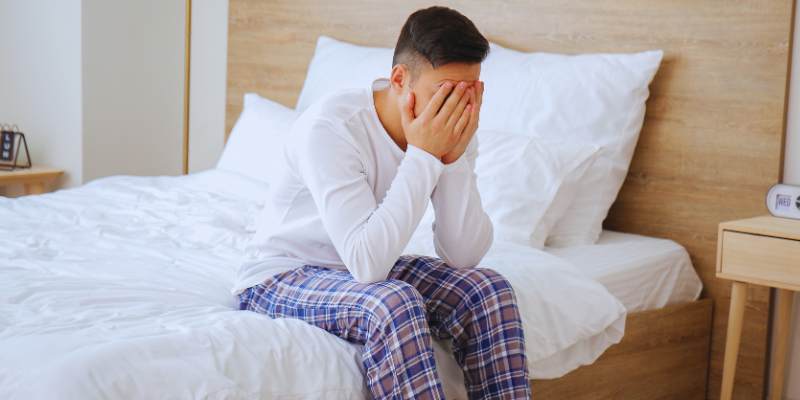Your health depends on sleep quite heavily. Your body cannot function as it ought without it. Sleep maintains your emotions, heart, and brain. Not getting enough sleep can make you tired all day. You can struggle to think coherently. Your immune system can weaken, making you more likely to get sick. Stress or hectic lives cause many people today to suffer from sleep deprivation.
Short-term and long-term problems can result from this one. It can increase one's chances of weight increase and heart issues. Fortunately, you can get better at sleeping. You can modify your everyday schedule. These adjustments enable your body to sleep through the night more peacefully. You will find five simple strategies in this guide to prevent sleep deprivation.

5 Tips for Avoiding Sleep Deprivation
Below are five simple and effective tips to help you avoid sleep deprivation and feel more rested:
Create a Consistent Sleep Schedule
Every day, going to bed and waking up simultaneously is quite beneficial. Your body regulates sleep through a natural clock. Following a regimen helps this clock to run most effectively. Your body becomes confused if you sleep for several periods. That makes sleep more difficult. However, on weekends, try to maintain your sleep and waking hours the same. It will prepare your body for night sleep and morning awakening. Moreover, a consistent sleep routine helps you sleep deeper and feel refreshed. If naps in the afternoon cause difficulty sleeping at night, avoid them. If you snooze, keep it brief—no more than half an hour. Long naps can upset your sleep pattern. Choose a bedtime such that you obtain seven to nine hours of sleep. Keep following it even if you are not exhausted. This battles sleep deprivation and keeps your body in rhythm.
Limit Screen Time Before Bed
Before bed, too much screen time can disrupt your sleep. TVs, iPads, and cell phones all emit blue light. Blue light tells your brain it's daytime. It stops your body from manufacturing melatonin, which helps you fall asleep. That makes sleep difficult both now and later. At least one hour before bed, try to turn off every screen. Read a book, keep notes in a journal, or listen to subdued music instead of your phone. You might also have a nice bath or soft stretch. These leisure pursuits enable your body to settle down. While adopting "night mode" or blue light filters on your devices could assist, cutting off screen usage entirely is advisable. Before bed, also avoid disturbing shows or tense news. They can keep your head occupied and complicate sleep. Less screen time before bed translates into more peaceful, deep sleep and improved health.

Create a Relaxing Bedtime Routine
Your nighttime ritual should be calm to enable you to fall asleep faster. Doing the same peaceful hobbies every night signals to your brain it's time to relax. Start your bedtime ritual about thirty to sixty minutes before you want to go to sleep. Choose calm activities, including deep breathing, reading, or mild music listening. You might also sip warm, caffeine-free tea or gently stretch. Steer clear of loud noises, brilliant lights, and intense shows or sports. Avoid working or checking emails before bed. That can cause your brain to remain overly busy. To help you to sort out your ideas, try journaling. During your nighttime ritual, use low lights to assist your body in melatonin production. You will thus naturally get tired. Your body learns when it comes time to unwind when you follow the same nightly routines. Over time, a leisurely evening ritual helps lower stress and promote better sleep.
Make Your Sleep Space Comfortable
Your surroundings highly influence your sleep quality. A peaceful and comfortable bedroom aids in physical relaxation. Check your room for chilly, dark silence. If outside light bothers you, use blackout curtains. Try running a white noise machine or fan if your neighborhood is noisy. Aim for a chilly bedroom temperature—between 60 and 67 degrees Fahrenheit. Most people find their sleep improved in a cold room. Check that your pillows and mattress are comfortable yet supportive. Your bed might be due for replacement if it seems ancient or uncomfortable. Fresh air and clean linens also let you unwind—clear clutter and everything that stresses you. A clean room exudes peace. To create a peaceful atmosphere in the environment, use lavender among soothing smells. Use your bedroom neither for TV viewing nor for work. It enables your mind to view the bedroom as solely a sleeping venue.
Limit Caffeine and Heavy Foods Before Bedtime
Your sleeping quality depends on what you eat and drink. Coffee, tea, soda, and chocolate all have caffeine. Your body can retain it for many hours. Avoid caffeine after 2 p.m.; it keeps you up and aware. Stop even sooner if you find yourself sensitive to coffee. Steer clear of big or spicy dinners as well late in the evening. They can upset your stomach or bring about heartburn. That makes lying down and relaxing challenging. Try to wrap up dinner two to three hours before bed. Should you become hungry later, have a little snack consisting of yogurt, fruit, or crackers. Steer clear of junk food and sweets since they disrupt sleep and provide little energy. During the day, sip water; avoid too much liquids at night. That keeps you from waking up for bathroom excursions. Your body will sleep better if you choose the correct foods and beverages at the proper moment.
Conclusion:
There are many different ways sleep deprivation can influence your body and mind. It causes you to grow weary, anxious, and less focused. Still, you may take little measures daily to help your sleep—less screen time, a regular sleep schedule, and a calming ritual all assist. Creating a comfortable bedroom and avoiding late heavy meals or coffee also help promote excellent sleep. Though basic, these ideas are effective. Following them might enable you to fall asleep longer and faster—better sleep results in more energy, a stronger immune system, and a nicer attitude daily.












